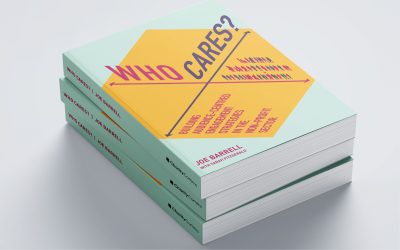How to have ideas
An excerpt from our book, ‘Who Cares?’
Creativity, surely, is innate. It’s something mysterious that you’re just born with, right? So, while some of us lead predictable, rational lives, others are blessed with flashes of inspiration that propel the rest of us forward.
Not so. In the words of American artist Chuck Close: ‘Inspiration is for amateurs. The rest of us just show up and get to work.’
Close is telling us that creativity is not just about that single ‘light bulb moment’. It’s about process. So the people among us who appear to be more creative, who seem to come up with all the good ideas, are just those who have understood the creative process, learned how it fits their way of thinking, are willing to take some risks and – most importantly of all – put in the hard work.
This chapter looks different from the rest. That’s because I think you’ll find it more useful to reflect on this subject and find what works for you than to slavishly adhere to a set of exercises. Ultimately a strategy is not a SWOT and a PEST and a research report. You need these, of course (which is why they’re in this book), but they exist only to create the conditions for producing ideas and to help you decide whether they’re any good.
To help us along I’ve dug around in a few books and blogs, talked to friends and colleagues, and put their thoughts together with a few of my own. They don’t all slot neatly together, although you’re bound to spot a few common threads.
Each come at the question from a different angle, which I hope will help you generate ideas for your strategy. You’re going to need lots of them.
—
More news
The inclusion illusion: Are we more progressive than we think?
The inclusion illusion: Are we more progressive than we think?
Read our book on audience-centred engagement strategies
In the midst of rapid social and political upheaval, charities and NGOs are facing new and unfamiliar challenges. We wrote the book on audience-centred engagement strategies.
A bumpy start for Starmer but some (kind of) positive news for charities.
A bumpy start for Starmer but some positive news for charities.
Getting down with the kidz: why the third sector needs to get to know Gen Z and millennial donors a whole lot better
Consumer brands, influencers and grassroots activist movements are all vying for attention in the ‘purpose’ space.

